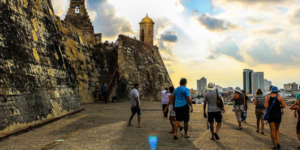Colombia Spanish immersion: how not to “give papaya” as a tourist
Nowadays, Colombia is one of the most promising tourist destinations in the world, and there are already millions of people interested in discovering what this country has to offer. Colombia has huge biodiversity, beautiful landscapes, all types of weather, many friendly people, and great gastronomy. That is why if you are thinking of taking Spanish courses in this country, you should learn Spanish in Medellín to get a real Colombia Spanish Immersion.
Nevertheless, if you would like to visit our country, there are some aspects of the culture you should consider. One of those is: we do not want you to “give papaya” or to have any disappointing experiences. If you are interested in taking some Spanish lessons, this is an essential expression you need to be familiar with, even if you are part of Spanish classes online.
The Colombian expression “dar papaya” means something like “give a chance.” In our context, it means that you should not make it easy for someone to steal from you or take advantage of you. It’s a warning for you to not go out showing your brand new smartphone, your cash, your camera, or any other valuable objects, especially in big cities. It is important to always be cautious and know who you are going out with and where you are going. Moreover, there are 3 different situations you may want to consider not to “give papaya:”
What is a Colombian Spanish Immersion? At parties

Foremost, try to use a handbag or a belt bag, and do not take a lot of cash with you. If you do, try to be prudent at the time you take it out. Colombian people are very friendly and they would like to continue inviting you to an after party; do not go to neighborhoods far from your residence, hostel, or hotel. In all situations, do not take people you have just met back to your place. Finally, if you get a taxi or any other type of transportation, send the license plate number and your location to a friend, just in case. We wouldn’t like your Colombian Spanish immersion to end up with an unwanted outcome.
Now that you know that you know not to “give papaya,” you can go for a walk in the streets of cities like Medellín. If you party with your friendly Colombian friends, and they offer you a shot of the local spirit (aguardiente), just accept it and invite your host to share the drink. This is also a type of Colombian language. Take it as a gesture of friendship and unity; after the first drink, you may want to continue sharing spirits with your Colombian friends, so always, always take cash with you. Colombia is still very much a cash-based economy and paying by credit card can be impossible in some places, especially when traveling to small towns; so always make sure you have enough cash on hand.
At a party, remember that in this country, people really love to dance. Although it is not true that all Colombians are professional dancers, we all try to dance. Don’t say you don’t know or can’t dance because refusing a polite invitation to join someone in a dance just doesn’t look good on you. So let out your nerves and embarrassment, get on the dance floor, and shake your arms and legs!
Watch out! Many Colombians dance very close to each other, even if they haven’t met before. So when your partner gets really close to you, while you’re dancing salsa, for example, it doesn’t mean they’re flirting or looking for something else; just follow their steps and enjoy the dance.
Some Medellín Spanish schools offer the chance to take salsa classes in partnership with professional dancers. This is also an excellent opportunity to take your Colombian Spanish immersion even further and enjoy this wonderful rhythm.
You may be interested in: Free salsa dance classes in Medellin
How not to “give papaya” at the restaurant

After a party, you may be hungry. Colombia is a country with a cuisine worth trying, and we are passionately proud of our cuisine. There is always food in our homes, even when we do not have guests for dinner, and we have countless tropical fruits, arepas in roll form, and delicious empanadas or fritters. This is a country where an offer of food is an offer of friendship, and the refusal will be seen as a rejection or as an offense. This is another representation of the Colombian language. So, let’s eat!
If you do not want to “dar papaya,” then we also recommend you check the prices on the menu before going into a restaurant and always ask for the receipt after your meal. Normally, the food in this country is cheap, although it depends on the area. The tip is 10% of the total bill and it is voluntary. Don’t forget to practice all the ways to communicate that you’ve learned in your Spanish classes in Medellín. They’re going to be really useful during your visit.
Here’s another tip: if you are in a public restaurant and sitting near the street side, do not leave your cell phone on the table. There are often many beggars, singers, dancers, or magicians making shows and they usually go to your table asking for help or a tip; they might have bad intentions and you could lose your phone or wallet with their performance as a distraction. Do not give anyone a reason to take advantage of you! Ask your teacher in your Spanish lessons how to interact kindly with these people so that you have no uncomfortable situations during your visit.
What is a Colombian Spanish Immersion? On the street

In Colombia, you don’t need to worry too much about being on time or being late somewhere. This is not the most punctual country (although there are many punctual people). Colombian time can be much more flexible than the kind of punctuality many tourists are used to; so relax a bit and don’t get mad if they say you’ll be picked up at 8 am, and they arrive closer to 8:30 am., and set your watch to local time. It can be a little bit frustrating if you let it get to you, but if you’re on vacation, the more you relax, the more fun you’ll have.
When you go out, do not wear extravagant jewelry or very expensive watches. Do not make yourself a target by showing off your phone, texting, or making calls. Try to walk through public places and main streets in the cities, and if it is late, take a car rather than walk. Make sure that your teacher explains to you in your Spanish classes which are the places where you should be more careful, despite the fact you never should dar papaya at any time and in any place.
Moreover, do not overpay for renowned brands such as clothing or accessories (Nike, Adidas, Ray Bans) from stores on the street, most of the time they are fake and low quality. Do not go to remote neighborhoods or towns, if so, do it with a guide. It is not as dangerous but it is better if you don’t give papaya. Some Medellín Spanish schools have alliances with recognized and authorized tours, so feel free to ask them for information so you can be more relaxed in these situations.
Additionally, do not change your cash (dollars, euros) on the street, it is much better at an exchange house, since on the streets you may obtain fake money. It is not difficult to recognize, however, as the paper is of bad quality and if you get it wet it will be destroyed easily.
Finally, there are so many sellers, baggers, and homeless people outside, if you want to really help them you should provide them food. Giving money does not actually solve the problem.
So far, here you have some tips so that you do not “give papaya” when you come to your Spanish immersion in Colombia. These are just little suggestions, but they shape our cultural background, and it is worth knowing when you travel through this beautiful territory. So, let’s eat, dance and drink aguardiente!
By Ricardo Ceballos Sánchez
Are you searching for a Spanish School? Contact us through the WhatsApp +57 312 8698268 or our e-mail info@colombiaspanish.com




